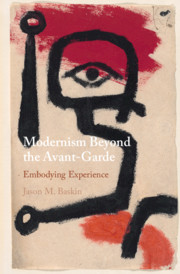
- Publisher:
- Cambridge University Press
- Online publication date:
- November 2018
- Print publication year:
- 2018
- Online ISBN:
- 9781108525961
- Subjects:
- Literature, English Literature after 1945
Last updated 10th July 2024: Online ordering is currently unavailable due to technical issues. We apologise for any delays responding to customers while we resolve this. For further updates please visit our website https://www.cambridge.org/news-and-insights/technical-incident


Critics have traditionally maintained that capitalism's resurgence after the Second World War precipitated the transition from modernism to postmodernism. This revisionist account shows that modernism does not simply decline. By foregrounding phenomenological conceptions of bodily experience, Jason M. Baskin reveals modernism's ongoing vitality. Key postwar writers, critics and philosophers, including Elizabeth Bishop, Ezra Pound, Ralph Ellison and Raymond Williams, as well as Maurice Merleau-Ponty and Theodor Adorno, developed an aesthetics of embodiment that adapted modernism to a new postwar landscape. Working across differences of race, gender, national and intellectual tradition, genre and form, Baskin contends that these authors used ordinary bodily experiences, such as perception, memory and laughter, to imagine modes of common being and purpose that were otherwise unavailable in a postwar society dominated by liberal capitalism.
 Loading metrics...
Loading metrics...
* Views captured on Cambridge Core between #date#. This data will be updated every 24 hours.
Usage data cannot currently be displayed.